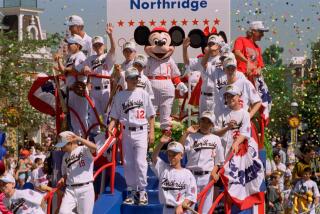Soviets Seeking to Get Hang of Baseball
- Share via
ANNAPOLIS, Md. — The start of a three-week tour of the United States found Alexander Ardatov, coach of the Soviet national baseball team, trying to pick up one of the game’s most enduring rituals.
“It’s too early to say what we will learn, but one thing is for sure -- I have not learned how to chew tobacco,” he said.
As Navy’s 21-1 victory Tuesday at Max Bishop Field would attest, there are a few other things that the Soviets still need to get a hang of. In stylish doubleknit uniforms underneath red satin jackets with “CCCP” stenciled in gold, the Soviets looked more than competent; unfortunately, a short time later, the umpire yelled, “Play Ball.”
The visitors, bringing a rather literal interpretation to the phrase spraying the ball around the yard, committed eight errors -- half of them in the first two innings. Things weren’t much better at the plate, the Soviets going without a hit until the fifth.
“It’s okay,” said assistant coach Guela Chikhradze. “We thought 30 to nothing.”
“We are still trying to find the right combination of speed, strength and intelligence,” added another assistant, Victor Pyanych. “The thing that we need to do is teach the game to our 8 and 10 year olds -- 10 years after that we’ll be a real threat.”
According to Ardatov, the Soviet goal is to qualify for the 1996 Olympic Games, but that may be a too much for a country that only was introduced to the sport two years ago.
Ardatov, who played for the powerful Dynamo hockey club, said he knew that a game called baseball existed but confessed he knew nothing else about it when he was selected to coach. Cuba and Nicaragua have sent advisers to the Soviet Union to teach the game’s finer points but the process has been a slow one.
“It is very difficult,” Ardatov said. “You take a high-class baseball player and put him on the ice for hockey and you’ll see what I mean.”
The country has to import all its equipment; according to Rob Benjamin of Heritage Sports, directors of the tour, there are a total of just 100 baseballs in the Soviet Union. Should a pitcher get his hands on one, there are no mounds from which to practice. The first baseball diamond has yet to be built; the teams that have sprouted up have to work out in far corners of soccer fields.
In order to induce recruits, the Red Army has offered a release from military duty for servicemen who volunteer to play. There’s also a weekly salary of 238 ruples ($368), which is more than the average Soviet worker earns.
The national team discovered shortstop Kuca Bibilashvili, 21, on one of the soccer fields. From the Georgian capital of Tbilisi, he is perhaps the Soviet’s flashiest athlete, charging through the infield to take balls on the short hop and throwing to first base in the same motion.
“The Georgians are always flashy,” kidded Chikhradze. “They’re a lot like the Italians.”
The tour will include stops against college teams from George Washington (3 p.m. Wednesday at RFK Stadium in Washington), Maryland, Virginia Commonwealth, North Carolina, Georgia Tech, Florida Southern and Rhodes College in Memphis, as well as a game against the minor league Peninsula Pilots in Hampton, Va.
The visitors probably won’t win a game on the trip but that’s to be expected, given their brief experience. The limited history also leads to some unusual criteria for picking the team members. Among the position players, experience in handball is considered important because it requires hand-eye coordination.
The starting pitcher is Alexander Dundik, 32, a right-hander from Moscow with an 85-meter javelin throw to his credit. Another, Edmundas Matusyavichus, threw it 80 meters. Both were chosen because of their proficency in the field event, which approximates throwing a baseball.
But that doesn’t convert into 90 mph fast balls or pinpoint control. Dundik only gave up four hits in the first inning of Tuesday’s game but found himself trailing, 10-0, after walking four Midshipmen and hitting two others.
It certainly allayed the major concern of the Navy players, who arrived back at the Academy at midnight after playing a doubleheader at Yale and were worried about potentially playing foils as well as goodwill ambassadors.
“It’s really a no-win situation for us,” said team captain Chris Fatheree. “They’ve only been playing for two years so if we win it’s no big deal but if they beat us we look like idiots.”
The Soviets cheerily accepted Tuesday’s loss, but the game deflated the hopes of a group of grade schoolers from Annapolis, who carried signs that read “Go CCCP -- Beat Navy” and cheered loudly for the visitors throughout the contest.
“We met them at the mall yesterday and we waved to them,” said 12-year-old Patrick Donlin. “They’re really nice, they just can’t understand us.”
The trip to the mall was one of the few public appearances made by the team. Since its arrival last weekend there have been bus tours of both Washington and Annapolis with stops at the White House and Soviet Embassy and the Naval Academy. Monday night the group met with the Maryland Senate, which issued a proclamation on behalf of the Soviet visitors.
More to Read
Go beyond the scoreboard
Get the latest on L.A.'s teams in the daily Sports Report newsletter.
You may occasionally receive promotional content from the Los Angeles Times.






